The Use of Artificial Intelligence in Distance Education
The Use of Artificial Intelligence in Distance Education
Author(s): Krystian TuczyńskiSubject(s): Education
Published by: Wydawnictwo Akademii Nauk Stosowanych WSGE im. A. De Gasperi w Józefowie
Keywords: e-learning; distance education; pedagogy; information and communication technologies; artificial intelligence
Summary/Abstract: Summary: In this article, the examination of the influence of artificial intelligence (AI) on the educational process is conducted, with a particular focus on its impact on individualized teaching, the monitoring of educational progress, and student motivation. The discussion delves into diverse AI applications, including the customization of educational materials, adaptive progress tracking, and the introduction of innovative motivational techniques. Emphasis is placed on the positive aspects of incorporating AI into education, while concurrently underlining the importance of using this technology with awareness and discretion. Furthermore, the article seeks to dispel common misconceptions about the role of AI, particularly in generating educational content, and stresses the irreplaceable role of the teacher as a mentor in the learning process. A critical point is made about the imperative need to educate all participants involved in the educational sphere to effectively leverage the potential benefits of artificial intelligence. Objectives: The aim of the article is to review current trends and practices related to the use of technology in education. The authors attempt to understand how various technological tools influence the teaching and learning processes. Key objectives include analyzing the role of technology in supporting educational processes and its impact on students and teachers. Additionally, the authors identify challenges and opportunities associated with implementing new technologies in educational practice. Finally, recommendations are formulated for teachers and educational institutions regarding the effective use of technology in teaching. Methods: The methodology described in the article is review-based and focuses on the analysis of literature and existing research on technology in education. The authors examine various approaches presented in the literature, avoiding the conduction of their own empirical research. The main methods include a literature review, during which available studies, articles, and publications concerning educational technology are analyzed. Furthermore, the authors compare examples of technology applications in different educational contexts, highlighting both positive and negative aspects of these implementations. Ultimately, the authors provide a critical analysis of the diversity of approaches to technology in education, focusing on their effectiveness and impact on educational processes. Results: The integration of artificial intelligence (AI) in education enhances personalized teaching, adaptive monitoring of student progress, and engaging motivational strategies. AI customizes learning experiences by analyzing student performance, enabling educators to provide targeted support and foster engagement through interactive platforms. However, challenges such as data privacy concerns and the risk of over-reliance on technology must be addressed. Striking a balance between leveraging AI’s benefits and mitigating potential drawbacks is essential for achieving positive educational outcomes. Discussion: The article underscores the importance of artificial intelligence (AI) as a supportive tool in education, designed to enhance students’ skills without supplanting their own efforts. It addresses common misconceptions regarding AI’s ability to autonomously generate content, stressing the necessity for comprehensive education on the responsible use of this technology among students, teachers, and parents. The role of teachers is emphasized as pivotal; they act as mentors and guides, helping students navigate the integration of AI into their learning processes. Moreover, the article highlights the importance of maintaining student motivation, advocating for a balance between the advantages of AI and traditional teaching meth
Journal: Journal of Modern Science
- Issue Year: 60/2024
- Issue No: 6
- Page Range: 881-895
- Page Count: 15
- Language: English

